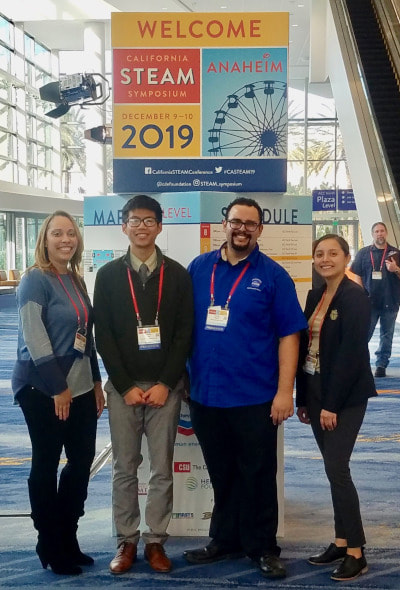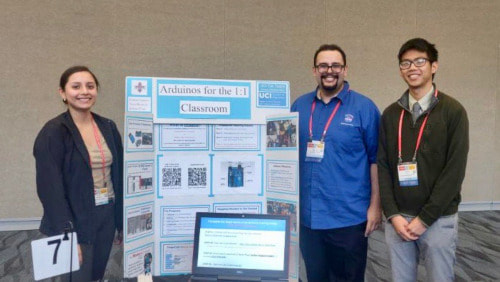"Presenting with Joshua Yuan and Nora Renteria at the STEAM Symposium was an amazing experience," Gagnier said. "Their voices amplified the message of the presentation and was inspirational for educators in attendance. It truly excites me to be able to work with future teacher leaders such as them and see them share their enthusiasm and passion for innovating education." Attendees included PK-20 educators, educational administrators, non-profit organizations, community associations, policymakers, educational technology companies, and industry business partners.
"Anchored in Equity and Social Justice: STEAM and PBL for Everyone" Synopsis: How do we use STEAM and PBL to transform pedagogical spaces? We transform learning by engaging students with topics related to equity and social justice, and by teaching student agency through action research. This session addresses issues of equity and social justice within STEAM and beyond the classroom, while embracing the principles set by the CA Department of Education's description of equity: "Ensuring equity in education is a necessary component in narrowing the achievement gap. Teachers and school leaders ensure equity by recognizing, respecting, and attending to the diverse strengths and challenges of the students they serve. High-quality schools are able to differentiate instruction, services, and resource distribution to respond effectively to the diverse needs of their students, with the aim of ensuring that all students are able to learn and thrive." "Arduinos for the 1:1 NGSS (Next Generation Science Standards) Classroom" Synopsis: All students deserve Computer Science education, Engineering education, and Science education. California State adopted standards and teachers agree with this, however, the pathway can be seen as extremely difficult, especially for those without a background in technology. This presentation aims to demystify the complexity of robotics and coding for STEM teachers. To accomplish this, practical methodologies for implementation, digital resources, and hands-on experience with Arduinos will be shared with all in attendance. An Arduino is a small programmable device that can be used to collect data with sensors and complete mathematical computations. Attendees will see how to use Arduino to replace current probeware, enhance existing laboratory experiences, and inspire students to go further with the devices in STEM projects and competition. Comments are closed.
|
Resources for:
|
|



